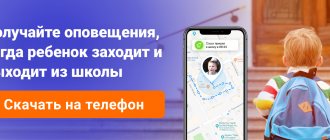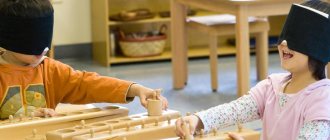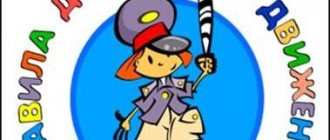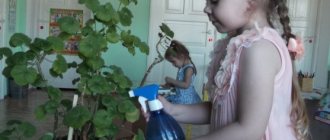In September 2022, changes appeared in the Education Law. Now education will give students not only knowledge and skills, but also instill moral and spiritual values that will become the basis of personality. To do this, teachers of educational institutions need to strengthen the educational part of the programs so that they meet the new requirements of the President. In the article we will discuss the essence of the requirements and how to implement them in kindergarten.
Federal Law No. 304-F dated July 31, 2020 caused a mixed reaction from educators. The question arose whether this situation applies to kindergartens, if the preschool program already includes educational work. It is even more difficult to single out purely educational moments, because they are closely related to educational ones. However, the law was introduced to place emphasis on the socialization and development of children in organizations, including kindergartens.
Preschool education
Preschool education (receiving primary education) is the first structured knowledge a child encounters before entering adulthood. Preschool education covers an approximate period of time - up to six or seven years, until the child goes to school, where he receives knowledge, skills and abilities.
The preschool period is a very interesting, educational and at the same time responsible period in the life of a child, during which he must fully master such important areas for his future as educational, intellectual, interaction, mental and sensitive...
All-Russian Forum “Childhood Landmarks 3.0”
On November 2-3, the All-Russian Forum of Preschool Education Workers “Childhood Guidelines 3.0” was held online. The event was organized by the International Pedagogical Academy of Preschool Education (IPADO) and the Association for the Development of Quality in Preschool Education (ARCADO) with the support of the Ministry of Education of the Russian Federation, the All-Russian Trade Union of Education, the State Duma of the Russian Federation, the Public Chamber of the Russian Federation, and the Women's Union of Russia.
The theme of the forum – “Strategy for the development of preschool education based on the traditional spiritual and moral values of the peoples of the Russian Federation” – meets the modern challenges of the time.
The forum was held in the context of significant changes in Russian education, which are related to the implementation of national projects, amendments to the Constitution of the Russian Federation, and current directions of state educational policy. Forum participants were greeted by:
- Director of the Department of State Policy and Management in the Sphere of General Education of the Ministry of Education of Russia Evgeniy Evgenievich Semchenko;
- Chairman of the Commission of the Public Chamber of the Russian Federation for Physical Culture and Popularization of a Healthy Lifestyle, President of the All-Russian Federation of Rhythmic Gymnastics Irina Aleksandrovna Vinner-Usmanova;
- Chairman of the All-Russian Trade Union of Education Galina Ivanovna Merkulova;
- The Chairman of the Women's Union of Russia, Ekaterina Filippovna Lakhova, sent her wishes for a successful event.
The first day’s event was chaired by the forum’s executive director, Anna Elanskaya. The speakers in their speeches spoke about different approaches to the issues of educating preschool children.
President of the Association for the Development of Quality in Preschool Education (ARKADO) Elfiya Dorofeeva touched upon the acute problems of preschool education. Despite the fact that preschool childhood is the first stage in the education system, there is still an opinion that the role of a kindergarten is to supervise and care for the child. The main reason is that laws are passed by people who are far from preschool education, and preschool educators and teachers have virtually no opportunity to express their opinions. This topic was continued to be discussed at a round table with the participation of leading experts in preschool education on November 3.
On November 3, 2022, as part of the forum, a round table “The role of society and professional communities in the formation of state policy in the field of preschool education” was held. The moderator of the round table, Inna Karakchieva, leading adviser to the Analytical Center for the Government of the Russian Federation, deputy director of the Department of Project Activities of the Ministry of Science and Higher Education of Russia, gave the floor to leading experts in the field of preschool education, representatives of the country's leading universities, research centers, and public organizations.
During the round table, issues of continuity between kindergarten and school, gaps in preschool education, and ways to overcome educational problems were discussed (Yamburg E.A., Honored Teacher of the Russian Federation, Doctor of Pedagogical Sciences, Corresponding Member of the Russian Academy of Education, Academician of the Russian Academy of Education, Director of the Moscow Education Center No. 109 ).
The speakers highlighted several important problems that require solutions:
- the need to build educators’ cultural competencies;
- early identification of children with developmental disabilities to reduce disability;
- early detection of sociopaths;
- return of doctors to preschool institutions;
- pairing plans to form continuity.
The general opinion was expressed by Galina Novikova, Doctor of Pedagogical Sciences, Doctor of Psychological Sciences, Professor, Academician-Secretary of the International Academy of Sciences of Pedagogical Education: “An independent public council for preschool education is necessary. It depends on us whether they will listen to us or not, and this in turn depends on how important and necessary for society we will raise and solve questions.”
Availability of preschool education
Russian President Vladimir Putin has instructed to ensure 100% availability of preschool education for children under three years of age by the end of 2023.
The corresponding instruction was given to the government together with the executive authorities of the Russian regions. This is stated in the list published on the Kremlin website.
“Taking into account previously given instructions, ensure the completion by the end of 2023 of measures aimed at ensuring 100% accessibility of preschool education for children under three years of age,” the instruction notes.
The President instructed to submit the report by December 15, 2022, and then once every six months. Putin also instructed to organize regular monitoring of the incomes of low-income groups of citizens.
Financial literacy for kids
The department and the Bank of Russia have developed a program for kindergartens, which is designed to teach children hard work and conscientiousness.
The Ministry of Education, together with the Central Bank, has developed methodological recommendations for kindergarten teachers on developing financial literacy for children aged five to seven years.
Teaching the youngest Russians the basics of financial literacy should be done in a playful way:
- theatrical performances;
- fascinating fairy tales;
- fun webquests.
This, according to the developers of the recommendations, will help to instill in children hard work, efficiency, enterprise, conscientiousness, responsibility and self-control, self-confidence, and the search for the best way out of the situation. The recommendations contain a list of basic concepts that correspond to the age and individual developmental characteristics of children.
As the Ministry of Education notes, in preschool age financial literacy is aimed at instilling in the child frugality, rational behavior, and a value assessment of the results of work.
Implementation of IT technologies
Today, many education news focuses on the introduction of innovative technologies, and 2022 will not be special in this regard. The development of modern IT technologies has a significant impact on the learning process, including in kindergartens.
The use of information and communication technologies in preschool education allows one to expand the creative capabilities of the teacher and has a positive impact on various aspects of the development of preschool children. For this purpose, children's institutions purchase interactive whiteboards, children's computers, and laptops for teachers.
On the one hand, it is good that IT technologies are being actively introduced into the field of preschool education, but at the same time, their use is not always justified. The responsibility of adults is to prevent threats to children's safety, allowing into the educational process only those technologies that open up new opportunities for the early sustainable development of children, and to create an accessible, smart, anti-stress educational environment.
News for schoolchildren
The Ministry of Education has approved new Federal State Educational Standards for primary and secondary classes. They will come into force on September 1, 2022. Perhaps, for the Russian education system this is one of the most important documents. It is clearly stated here, much more clearly than in the previous version, what children after the 4th and after the 9th grade should know and be able to do. Based on these standards, specific programs for schools and curricula will be developed, textbooks will be written and Unified State Examination tasks will be compiled.
So, in 2022, we can expect such innovations in preschool education in 2022.
New modules inside items
From 2022, primary school children will be taught how to handle money.
How are teachers and parents worried? Will there be a new item? The Ministry of Education reassured us: there will be no new subjects and the workload on schoolchildren will not increase. But new “modules” will appear inside some “old” items.
In the beginning, children will study these skills as part of the subjects “The World around us” and “Mathematics”. For example, the learning outcomes for the subject “Mathematics” for primary school state “the use of basic mathematical knowledge in solving educational and practical problems and in everyday situations to describe... phenomena... including in the field of personal and family finance.” And in the “okruzhayka” there is another aspect: the protection of personal information, including financial information - in reality and in the virtual space.
In basic school, from the 5th grade, children will begin to learn financial issues more deeply: they will be told how to protect savings from scammers and how to use funds rationally. And all this will also be organically included in several items:
- Social science;
- Computer science;
- Geography, etc.
The management believes that if the school is ready, has a base and specialists, then it is necessary to introduce the study of financial literacy, cybersecurity, and programming, because this is useful and in demand in the modern world.
Cancellation of compulsory 2nd foreign language
If in the 2021-2022 academic year officially a second foreign language remains mandatory for study in Russian schools, then from September 1, 2022 this norm will be abolished, and parents themselves will be allowed to decide how many languages the child will learn.
In fact, except for special language schools, and we don’t have many of them in our country, a second language in high school was a profanation. This must be admitted, many teachers believe. “He either did not exist at all, or he took up little time in the children’s lives.
That is why, already in the 2021-2022 academic year, many directors allowed parents of 5th graders to decide on the issue of learning a 2nd language. Thus, some schools still decided to maintain the opportunity to study a second foreign language, in particular Chinese. True, teachers and school principals are afraid that “spears” will fall for this, whether this will be a violation of the Federal State Educational Standards?
The fact is that the number of lessons and the period for studying any subject are not regulated in the Federal State Educational Standards. If fifth-graders, by decision of school parents, do not start studying it this year, there will be no violation. It is important that children do not lose the opportunity to study it, and that parents do not complain that this opportunity was taken away from them. The most important thing for the director is to competently draw up a curriculum so that parents, students, and teachers are satisfied.
OGE and Unified State Exam news
The return of the full-length OGE and USE in 2022 has become news No. 1 in school education, and graduates of the 2021-2022 academic year will have to take the State Exam as in the “pre-Covid” period.
“We see that all year the last graduating class hoped that the exams would be cancelled... Now I don’t want to announce that there will be no exams. Our proposal, which we submitted for consideration... to the Ministry of Education, is to return to the procedures that were... These are two compulsory subjects and two elective subjects,” Muzaev said during a meeting with parents of schoolchildren.
Thus, 11th graders who did not choose specialized mathematics at the Unified State Exam will have to take 2 compulsory subjects:
- Russian language;
- basic level mathematics.
You can read more about the innovations of 2022 in our articles on “FIPI OGE 2022” and “New rules for passing the Unified State Exam in 2022”.
Approval and control of the annual plan
When a new annual plan has been drawn up, all tasks have been spelled out and their executors have been appointed, you need to agree on the final version of the plan. Usually it is agreed upon with the teaching council. To do this, send an electronic version of the plan to employees the day before the meeting so that they have time to familiarize themselves and prepare their proposals and questions. If disagreements arise at the meeting, revise the plan accordingly. If the teaching council has no objections, put the stamp “Approved”.
After the plan is approved, new tasks must be communicated and instructions issued to everyone involved in their implementation. Then you can post the annual plan on the official website. If you decide to publish it, please exclude from the public version any information that should not be shared publicly. For example, information about working with official documentation or details of the anti-terrorist protection plan for preschool educational institutions.
Once the team begins implementing the plan, monitor its progress at a monthly meeting. To do this, it is convenient to create a checklist in which employees will note what they have completed and what they have not. In this sheet you need to register the reporting activities, performers and deadlines.
If you found this article helpful, please rate it on the star scale below, with 5 stars being very helpful.
We want you to read only interesting materials, and we will be grateful for your feedback!
Inclusive education
Almost a third of Russian schools and a fifth of kindergartens today are accessible for joint education of students with disabilities and limited health capabilities with their peers.
Speaking at the VI International Scientific and Practical Conference “Inclusive Education and Society: Strategies, Practices, Resources,” Deputy Minister of Education of the Russian Federation Denis Gribov clarified that, according to monitoring data from the Ministry of Education of Russia, in 2020 in Russia there were:
- 10.1 thousand (28% of the total) inclusive schools;
- more than 8 thousand (21.8% of the total) inclusive kindergartens.
Denis Gribov emphasized that in the regions it is important to continue working to create special educational conditions at all levels of education; new buildings of educational organizations must be built taking into account the accessible architectural environment and the necessary special equipment. It is also important to train the teaching staff of kindergartens and schools in methods of working with such children.
Digital hygiene
What are parents' biggest fears in the face of technology? Once they get sucked in like that, you can’t get them out. That virtual reality will become more attractive than real life. That someone out there, inside the global network, can deceive or offend a child.
So, playing together is also an excellent prevention. How will a child understand that this is an aggressive and angry game if you leave him alone with it? How will he know that enough is enough if you yourself are constantly “surfing”? How will he learn to recognize deception and bad intentions online if the interlocutor on the other side of the screen offers him something exciting, and you don’t ask anything at all, except whether the child washed his hands and learned the verse for the matinee?
Technology is a tool that you need to learn to use. In themselves they are neither harmful nor beneficial. And the parent should teach how to use it - by example, devoting time, attention and patience and showing HOW you should really treat this tool.
Technology in education is a beast that needs to be tamed and studied.
You can find out exactly how to do this at the EDCRUNCH 2022 conference.







